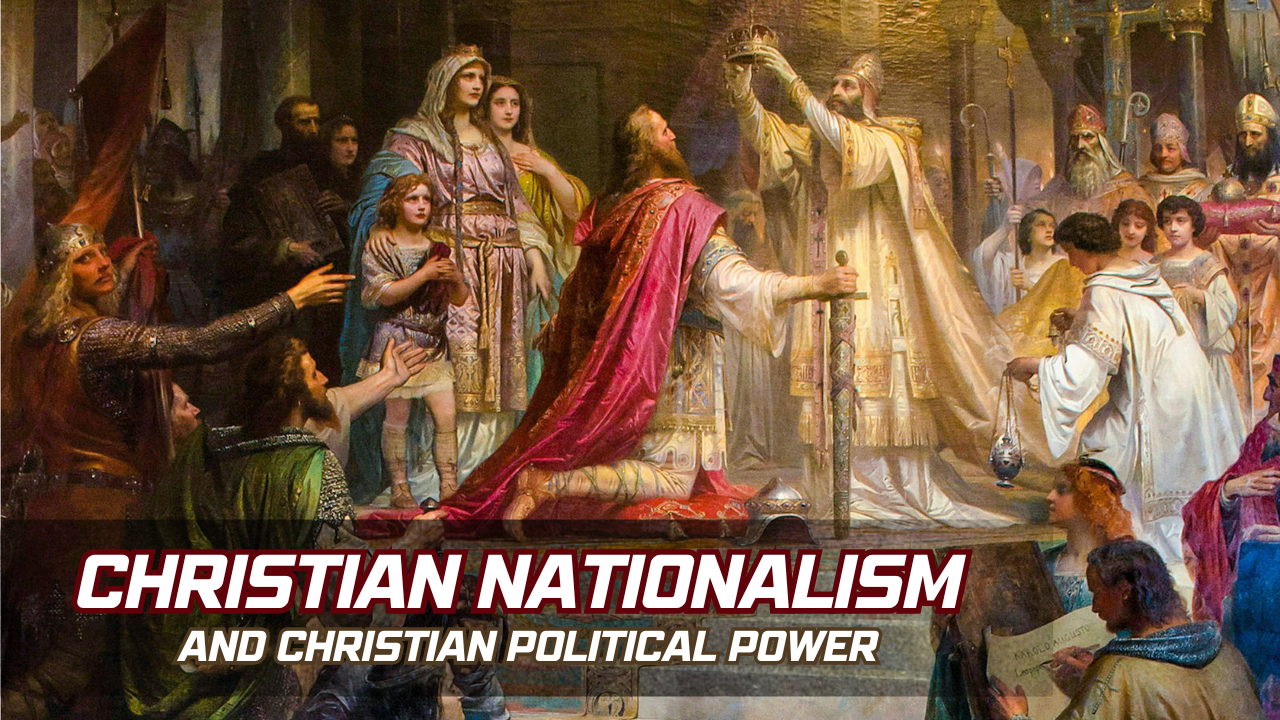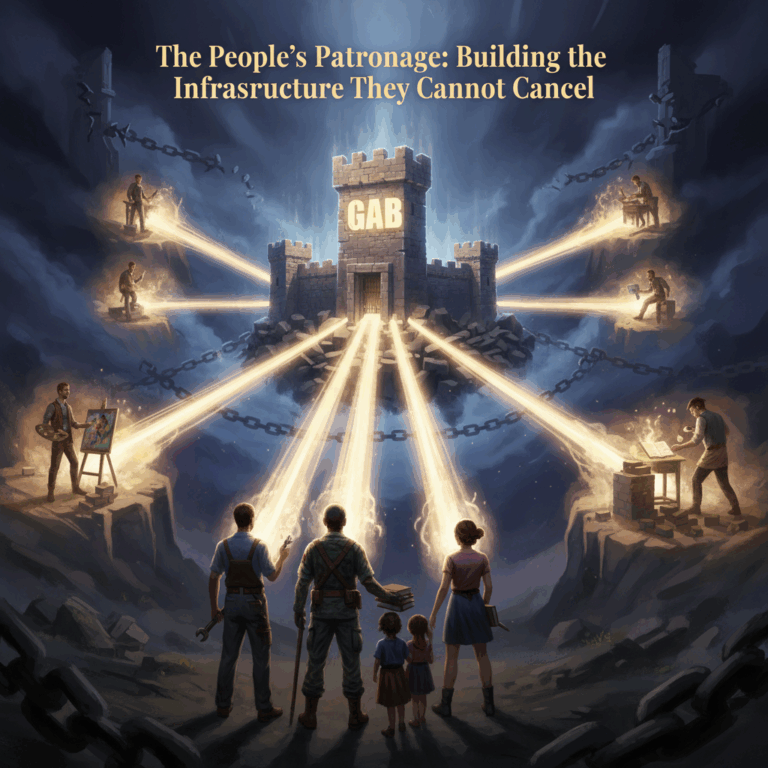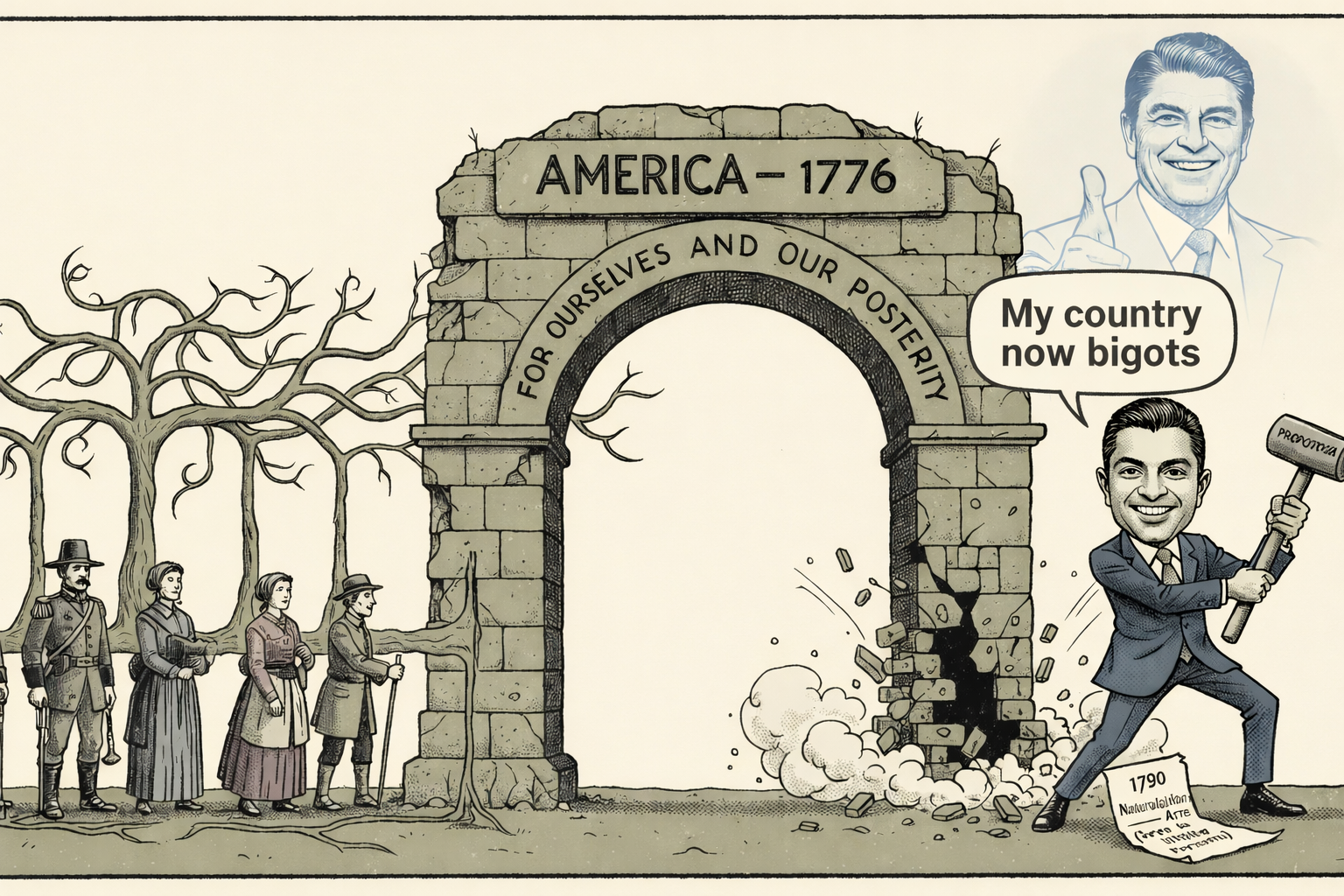Introduction
Far too many Christians have been told “The Bible doesn’t have anything to say about politics, so you shouldn’t care about it so much.” But that is simply not true, the Bible shows us God dealing with men who have political power all the time. Throughout the Bible, kings are reproved and judged by God for their wickedness, they are directed by His prophets, and they are praised when they are good and just. The Bible gives us so many examples of how God wants those with power to rule that to say “the Bible doesn’t have anything to say about politics” is, frankly, a sick joke.
The reason so many Christians believe that the Bible has nothing to say about politics is that we simply do not know the Bible—especially the Old Testament. The Book of Samuel, for example, is entirely about God bringing about a “revolution of elites,” a changing of the political order from the top down, starting with the removal of the wicked High Priest Eli and his sons, and then the replacement of the tyrannical and demonic Saul with a man after God’s own heart. The book shows that God giving His people a just and righteous king is grace to them from His hand.
2 Samuel 22, in particular, is a Psalm of David, and almost identical to Psalm 18. The fact that it is repeated here at the close of the book of Samuel isn’t just God trying to up the word count in the Bible like a student writing a term paper. It’s placement here is meaningful for the theology of the entire book. You’ll remember at the very beginning of the book of Samuel, Samuel’s mother, Hannah, sang a song about the child God had given her after years of barrenness. It isn’t just that God had given her a child, as wonderful as that is, but that God has given His people a deliverer to throw down the proud and mighty and raise up the humble and weak. That deliverer, Samuel, lead the way, like John the Baptist, to an even greater deliverer, David. This psalm is a record of God’s covenant keeping. He has made a covenant with His people to be their God, to be with them, and to deliver them from their enemies when they call upon His name. And He makes a particular covenant with that deliverer himself, David, that if he and his sons keep God’s law, God would never cease to keep a man on this throne. This psalm is a celebration of God keeping His covenant with His people. He is a God who does what He says.
2 Samuel 22:1-5122 Then David spoke to the Lord the words of this song, on the day when the Lord had delivered him from the hand of all his enemies, and from the hand of Saul. 2 And he said:
“The Lord is my rock and my fortress and my deliverer;
3The God of my strength, in whom I will trust;
My shield and the horn of my salvation,
My stronghold and my refuge;
My Savior, You save me from violence.4I will call upon the Lord, who is worthy to be praised;
So shall I be saved from my enemies.
5“When the waves of death surrounded me,
The floods of ungodliness made me afraid.
6The sorrows of Sheol surrounded me;
The snares of death confronted me.
7In my distress I called upon the Lord,
And cried out to my God;
He heard my voice from His temple,
And my cry entered His ears.
8“Then the earth shook and trembled;
The foundations of heaven quaked and were shaken,
Because He was angry.
9Smoke went up from His nostrils,
And devouring fire from His mouth;
Coals were kindled by it.
10He bowed the heavens also, and came down
With darkness under His feet.
11He rode upon a cherub, and flew;
And He was seen upon the wings of the wind.
12He made darkness canopies around Him,
Dark waters and thick clouds of the skies.
13From the brightness before Him
Coals of fire were kindled.
14“The Lord thundered from heaven,
And the Most High uttered His voice.
15He sent out arrows and scattered them;
Lightning bolts, and He vanquished them.
16Then the channels of the sea were seen,
The foundations of the world were uncovered,
At the rebuke of the Lord
At the blast of the breath of His nostrils.
17“He sent from above, He took me,
He drew me out of many waters.
18He delivered me from my strong enemy,
From those who hated me;
For they were too strong for me.
19They confronted me in the day of my calamity,
But the Lord was my support.
20He also brought me out into a broad place;
He delivered me because He delighted in me.21“The Lord rewarded me according to my righteousness;
According to the cleanness of my hands
He has recompensed me.
22For I have kept the ways of the Lord,
And have not wickedly departed from my God.
23For all His judgments were before me;
And as for His statutes, I did not depart from them.
24I was also blameless before Him,
And I kept myself from my iniquity.
25Therefore the Lord has recompensed me according to my righteousness,
According to my cleanness in His eyes.
26“With the merciful You will show Yourself merciful;
With a blameless man You will show Yourself blameless;
27With the pure You will show Yourself pure;
And with the devious You will show Yourself shrewd.
28You will save the humble people;
But Your eyes are on the haughty, that You may bring them down.
29“For You are my lamp, O Lord;
The Lord shall enlighten my darkness.
30For by You I can run against a troop;
By my God I can leap over a wall
31As for God, His way is perfect;
The word of the Lord is proven;
He is a shield to all who trust in Him.
32“For who is God, except the Lord?
And who is a rock, except our God?
33God is my strength and power,
And He makes my way perfect.
34He makes my feet like the feet of deer,
And sets me on my high places.
35He teaches my hands to make war,
So that my arms can bend a bow of bronze.
36“You have also given me the shield of Your salvation;
Your gentleness has made me great.
37You enlarged my path under me;
So my feet did not slip.
38“I have pursued my enemies and destroyed them;
Neither did I turn back again till they were destroyed.
39And I have destroyed them and wounded them,
So that they could not rise;
They have fallen under my feet.
40For You have armed me with strength for the battle;
You have subdued under me those who rose against me.
41You have also given me the necks of my enemies,
So that I destroyed those who hated me.
42They looked, but there was none to save;
Even to the Lord, but He did not answer them.
43Then I beat them as fine as the dust of the earth;
I trod them like dirt in the streets,
And I spread them out.
44“You have also delivered me from the strivings of my people;
You have kept me as the head of the nations.
A people I have not known shall serve me.
45The foreigners submit to me;
As soon as they hear, they obey me.
46The foreigners fade away,
And come frightened from their hideouts.47“The Lord lives!
Blessed be my Rock!
Let God be exalted,
The Rock of my salvation!
48It is God who avenges me,
And subdues the peoples under me;
49He delivers me from my enemies.
You also lift me up above those who rise against me;
You have delivered me from the violent man.
50Therefore I will give thanks to You, O Lord, among the Gentiles,
And sing praises to Your name.51“He is the tower of salvation to His king,
And shows mercy to His anointed,
To David and his descendants forevermore.”
Praise of YHWH (v. 1-3)
The Psalm is arranged chiastically, like so much else in the Bible, especially the psalms. The beginning and end match up, the second part and penultimate part, the third part and third to last part and so on, with the central part being the most important. This psalm has an A, B, C, B’, C’ arrangement. It begins and ends with praise of the Lord.
Here in the beginning, God is described as David’s rock, his fortress, his deliverer, the God of his strength, his shield, the horn of his salvation, his stronghold and refuge, his savior who saves him from violence. To start out with, consider how David describes the character of God. When we think of God, do we describe Him this way? Think of how personal this is to David. God is not so far off and separated from him as we so often act. He is intimately involved in the details of David’s life. God’s fingerprints are everywhere. Do we see things this way? When we describe God, is this what we say about Him? That He is our shield and strong refuge? Do we allow the psalms into our imagination? Do we allow them to shape what we think about our God? Just this point alone shows how desperately we need the Psalms, to read and meditate upon them regularly, to sing them regularly to give us the same view of God. We have enemies and we need to be delivered from them. And the psalms show us a God who does just this.
The Lord Delivers David Supernaturally (v. 4-20)
God delivers David from His enemies when he calls upon Him. David describes this from the perspective of heaven and from the unseen realm. Waves and floods of death and ungodliness and the sorrow of the underworld surround him. In response, he cries out to his God and calls upon His name. God sits in His heavenly temple and hears David’s voice. And God responds. The earth shakes and trembles at God’s anger. His smoke and fire are aroused. God bows the heavens and comes down, like at Sinai, with smoke and fire and darkness and lightning, riding upon His chariot driven by cherubim. His arrows and lightning bolts scatter David’s enemies. The sea and earth are divided and the foundations of the earth are uncovered by God to deliver David. Powerful enemies, far more powerful than David are destroyed by the Lord. In the end, David is brought into a broad place because of the Lord’s delight in him.
David’s righteousness (v. 21-28)
Why does God do this all for David? David tells us. The Lord rewarded him according to his righteousness and according to the cleanness of his hands He has recompensed David. He has kept God’s ways and has not departed from His God. God’s law was before David and He did not depart from them. David instead was blameless in them. The Lord repaid David according to David’s righteousness.
Reading this might be very confusing. Is David saying that because of his own works God saved him? What could this possibly mean? How do we reconcile this with justification by faith alone? That is a question we will return to in a moment.
David elaborates on this theme, to the merciful, God is merciful, and to the blameless, God shows Himself blameless, to the pure, He shows Himself pure, but to the devious, He shows Himself to be an even shrewder trickster than they are. This is an important point. To those who hate God, He doesn’t seem to them to be merciful and full of lovingkindness. They see Him and they hate Him. He brings down the haughty and proud to save the humble.
God looks different to those who love Him versus those who hate Him. Another pastor has famously said that the two tenets of atheism are 1. There is no God. 2. I hate Him. This is true. The unbelieving know God exists and they know it very well. And they hate Him. They hate Him because He frustrates their wicked plans. Even, especially, in this, God shows Himself to be a faithful God to His people.
Yahweh Delivers David by Empowering Him to Crush His Enemies (v. 29-46)
In the fourth section of this psalm, we see David being empowered to crush His enemies. What David describes in the heavenly places in the second section of this psalm, we now see on earth. The Lord is David’s light and lamp. By the Lord’s strength, David runs against an army and leaps over walls. God’s Word is proven again and again and is what makes Him the shield to those who trust in Him. God’s strength and power is David’s strength and power. He gives David the speed and quickness of a deer that a warrior needs. He gives him defensible high ground. He makes David’s hands weapons of war. God establishes David for warfare.
And so David fights. He pursues his enemies and destroys them. He destroys them and does not merely wound them. They fall under his feet. Those who rise against David, God subdues. He gives the necks of those who hate him to David. His enemies look for someone to save them, they even vainly call upon the Lord, but He does not hear them. Instead, David beats them into dust.
It isn’t just David that God is doing this for. He keeps David as the head of his people and the head of many nations. So many gentile nations have pledged fealty to David and they obey him out of fear for Him and for his God. All the mighty works that David ascribes to God in the heavens and in the unseen realm find their way into this world through David’s sword and spear. When God is acting in the heavens and smoke and fire and lightning and earthquakes shake the earth spiritually, what is that? In this case, it is David running his enemies through with weapons of physical warfare.
Praise of the Lord (v. 47-51)
And so David closes the psalm with praise of the Lord. He again is the rock. God avenges David, even though it is David’s own hands doing the work. It is God who has delivered David from his enemies. In response, David sings praises of God, not just in Israel but among the nations of the world.
The last lines help us to understand the theological point of the entire psalm: God is the tower of salvation to His king. He shows mercy to His anointed deliverer. To David and his descendants forevermore, because He has made a covenant with them.
Conclusion
How do we reconcile the middle of this psalm with what the New Testament teaches about justification by faith alone? Some people try to explain this by saying “well David is not truly talking about his own faithfulness and his own works and his own righteousness but the imputed righteousness of Christ.” If the question at hand was “why is God saving David from sin and eternal damnation?” That would indeed be the correct answer.
But the question is not about whether David is going to heaven or not. The question is there are human enemies of God and of David and of God’s people that are attacking and consuming them. God has made promises to protect His people from these enemies that are conditional upon their obedience. God has made particular promises to David that are likewise conditional upon David obeying God’s law. The question is not about David working out his own salvation through good works and not faith. The question is, is David keeping his side of the covenant with God?
And the answer in the psalm is, yes, he is. Even though, as we have seen, David has sinned, and he has sinned grievously. David himself acknowledges that he is a sinner in need of God’s grace, mercy, and forgiveness. That is what Psalm 51 is all about. Repentance is part of David’s blamelessness that he describes in this psalm. He sins and turns to the Lord when He does. And as we have seen, the sin does not come without consequences.
But the covenant God has made with Israel and with David himself, David has kept. That should be instructive to us here and now in our own day. I don’t have to tell you that we are in a position like David, where enemies surround us, they seem as if they have absolutely insurmountable power. All day long we wonder, what can we do against all this? And the other question should be, why are we in such a place to begin with?
Well, God’s people, the church, the people to whom all the promises of God, to Adam, Noah, Abraham, Moses, and David are “yes, and amen” in Jesus Christ, we are in a very bad place in our current day. We do not encourage our people to be faithful to God’s law. We do just about everything but that. We make excuses for sin. We make every accommodation for sin. We say “grace, grace, grace” all is grace. We forget Paul’s admonition against such antinomianism “shall we continue on in sin that grace may abound? By no means.” No, God wants a people who are faithful. He wants us to obey Him. This does not mean He expects His people to be perfect and immaculate. He instead expects a repentant people who want to obey Him and grow in their faithfulness to Him.
But what we have is not that. We have churches and leaders of churches who do not preach against sin, who do not preach repentance, who are terrified of offending anyone. And so when we see the enemies we are surrounded by, when we see the people in power over us who would literally steal our children and mutilate them, we cry out to the Lord to save us, but what happens? We are like the people in v. 42: they looked, but there was none to save; even to the Lord, but He did not answer them.
Why didn’t God answer them? Why didn’t God answer Saul when he cried out to the Lord to save him? Because he had abandoned God. He had rejected God’s law and sought to go his own way and do as he pleased. His ways did not please God. When God’s people today cry out to Him to save us from our enemies, why does He not hear us? Because we have rejected His law, we believe our own way is better than His way, that we “are under grace not law” so therefore we can do whatever we want.
If we want God to save our people, our people need repentance. They need to turn to the Lord, to obey Him, to delight in His law, to walk in His ways by the power of His Holy Spirit. And then He will hear our prayer.
So the charge to you is this: Pursue the Lord in faithfulness. Obey Him. Read and understand His word and do what He wants you to do. And if you are not, repent and ask His forgiveness. He is a god full of grace. He delights to forgive you of sin. We are not a people who have no hope when we sin. We are a people that can hope in Christ to restore us and wash us clean when we stumble. So trust in Him, walk blamelessly before Him like David, and watch Him grind His enemies into dust. In the Name of the Father, the Son, and the Holy Spirit. Amen!

Andrew Isker is the pastor of 4th Street Evangelical Church in Waseca, MN. He is a graduate of Minnesota State University and Greyfriar’s Hall Ministerial Training School, and he has served churches in Missouri, West Virginia, and Minnesota. He is the author (with Andrew Torba) of Christian Nationalism, and the author of the forthcoming book, The Boniface Option. Andrew, his wife Kara, and their five children reside in his hometown of Waseca, MN. He can be found on Gab @BonifaceOption.





